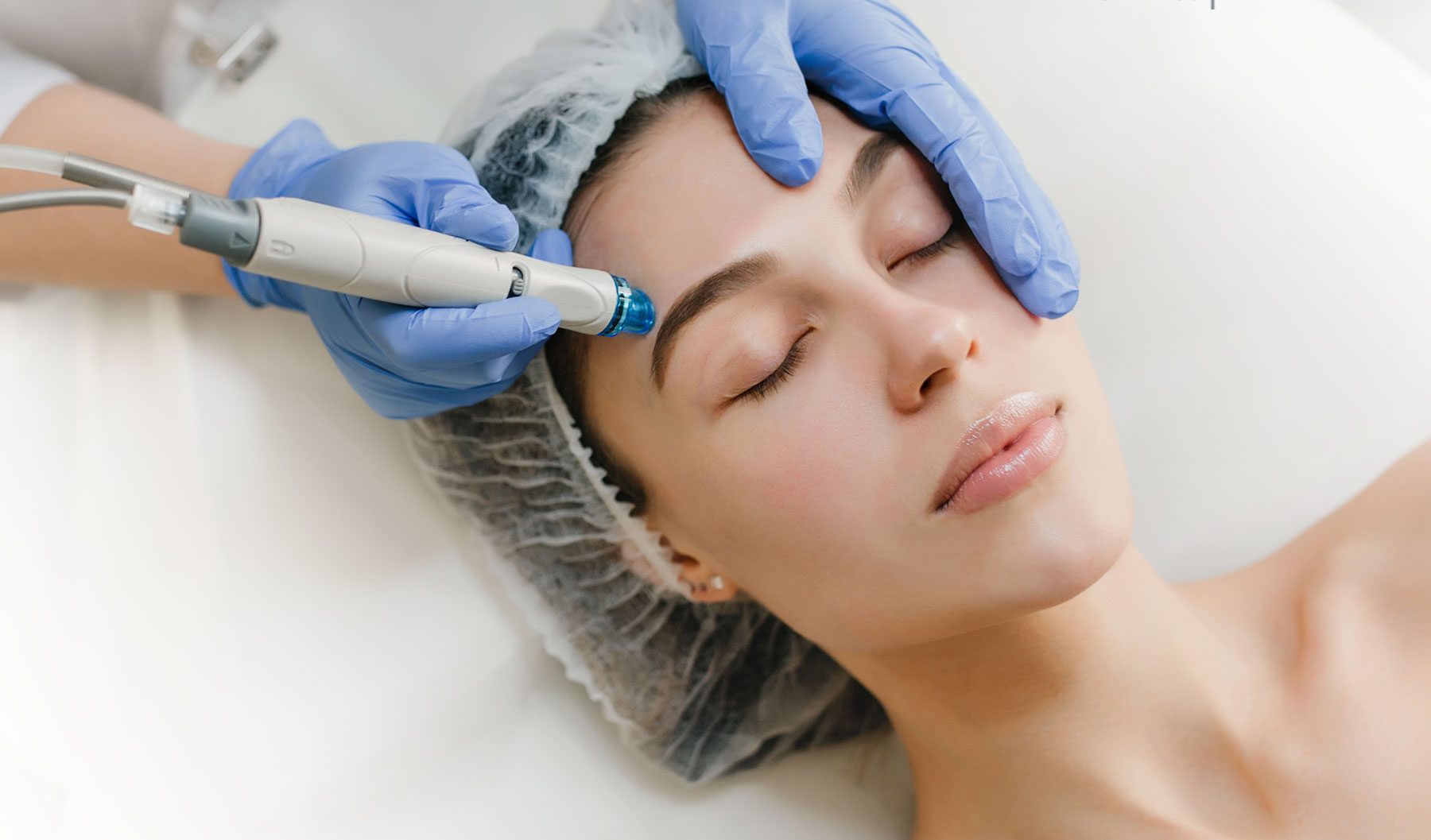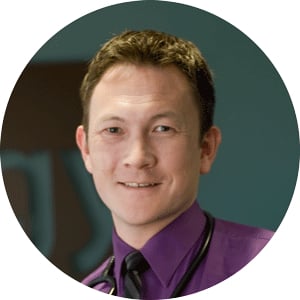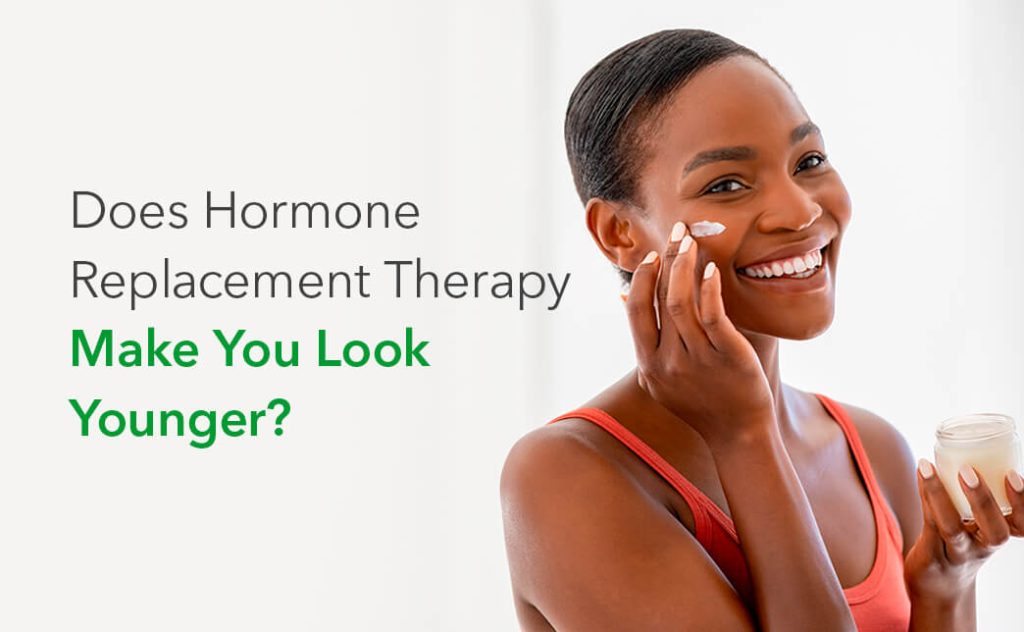
The days of our youth are some of the most cherished times in our life. Full of vigor with smooth skin and flowing hair, we often don’t realize the value of those gifts until they start to fade. While aging is a beautiful process in itself, holding onto aspects of your youth can also be admirable and healthy in many ways. As Frank Sinatra once crooned, “It’s worth every treasure on earth to be young at heart.” Looking and feeling young is excellent for your physical, mental and emotional health.
Often, hormonal changes during menopause, andropause or general aging complicate that goal of staying young at heart, body and mind. Whether it is aging signs like wrinkles, decreased sexual function or difficulties with concentration, the effects of hormonal changes can age us more than we like. One way to push back against those changes is through hormone replacement therapy. Continue reading below to learn more about how hormone replacement therapy can help you look and feel younger!
Our Hormones’ Effect on Aging
As we age, our body produces decreased levels of various hormones. These decreased hormone levels coincide with various aging signs and symptoms.
We have over 50 different hormones in our body, and all of these either affect or are affected by aging. These hormonal changes can affect your mood, sexual health, energy, metabolism and skin health, among other functions.
While aging impacts all hormones, hormones that have a noticeable impact on our body during the aging process are:
- Testosterone, particularly in men past the age of 40.
- Estrogen and progesterone, especially in postmenopausal women.
- Dehydroepiandrosterone (DHEA), which produces sex hormones like testosterone, estrogen and progesterone.
- Somatropin, also called the Human Growth Hormone (HGH)
- Cortisol, also known as the stress hormone.
These hormones fluctuate as we age and have widespread effects on our sex drive, energy levels, body composition, skin, hair and nail health.
To be specific, here are some of the most noticeable ways decreases in sex hormones impact our bodies as we age:
- Skin, hair and nail health: Decreased estrogen levels can have widespread effects on your skin, hair and nails. With your skin, decreased estrogen levels lead to thinner, less elastic and dryer skin with diminished circulation. As a result, wrinkles and other aging signs appear. Estrogen is also instrumental in hair growth and loss, as many individuals experience hair loss post-menopause. Concerning your nails, lack of estrogen can cause them to become brittle and break easier.
- Sex drive and function: As sex hormones, testosterone and estrogen impact your sex drive and function. For women, decreased estrogen levels during and after menopause can lead to diminished sexual desire, inability to orgasm and even pain during sex. Men may also experience reduced sex drive and have difficulty achieving or sustaining an erection.
- Body composition: Somatropin, estrogen and testosterone play pivotal roles in healthy muscle mass development. As such, decreases in these hormones directly lead to a loss of muscle mass. In postmenopausal women, this estrogen and somatropin loss directly coincides with increased abdominal fat. Men may also gain weight as their body produces less testosterone.
- Energy levels and overall mood: As you lose muscle, fat begins to form in its place. Your metabolism slows, directly impacting your energy levels. Thus, you may experience increased fatigue, difficulty concentrating and problems with memory. Mood changes and sleeping difficulties are also common with lowered testosterone and estrogen and increased cortisol levels.

How Does Hormone Replacement Therapy for Anti-Aging Work?
Hormone replacement therapy helps with anti-aging by introducing specific hormones that you are deficient in into your body. Most of the time, HRT involves DHEA and HGH, as well as testosterone for men and estrogen and progesterone for women.
HRT introduces these hormones to your body gradually so those hormone levels increase and achieve balance over time. As HRT balances your hormone levels, it counteracts many aging signs that occur with age and menopause. You are likely to notice improvements in your skin appearance, hair maintenance, muscle mass and sexual health.
How Does HRT Make You Look Younger?
HRT can make you look younger in several ways, improving the health and appearance of your skin, hair, nails and overall glow.
Skin
As menopause and hormonal changes can take a toll on our skin, HRT works to combat those aging effects in productive ways.
On a basic level, HRT makes your skin look younger by balancing the hormone levels contributing to aging signs. Those aging signs could include wrinkles, fine lines, lost volume, skin laxity and others.
On a deeper level, HRT boosts your skin’s youthfulness by stimulating the production of substances that keep your skin healthy. Estrogen and progesterone have many characteristics that aid in preventing aging signs on your skin. For example, they naturally increase hyaluronic acid (HA) and prevent the loss of collagen and elastin.
HA is a sugar molecule found in the fluid around your eyes and joints essential for maintaining skin elasticity and hydration.
Speaking of skin elasticity, elastin is a protein fiber that helps your skin bounce back into form like a rubber band after muscle contractions and other wrinkle-causing fiends.
Collagen is also a fibrous protein and arguably the most important one for your skin and connective tissues. It maintains the structural integrity of every connective tissue in your body, from your bones and ligaments to your skin and muscles.
In this way, HRT keeps your skin looking younger as the increased estrogen and progesterone help skin elasticity, firmness, hydration and thickness.
Hair
HRT can also do wonders for your hair, keeping those strands strong and luscious long after menopause. While dihydrotestosterone (DHT) is linked with hair loss, DHEA and estrogen are linked with thicker hair growth.
DHT is a by-product of testosterone that binds to hair follicles and weakens them. Although DHEA produces testosterone, it also increases endothelial cell proliferation. These cells maintain blood supply to your hair follicles to keep them healthy.
With that in mind, testosterone replacement therapy (TRT) will not induce thicker hair growth. However, HRT with estrogen and DHEA can create healthier hair follicles and increase hair growth. At the very least, HRT with estrogen and DHEA can prevent further hair loss after menopause.
Nails
With your skin and hair, your nails form your integumentary system. This system is the protective barrier between your inner organs and the external world with all its pathogens and hazards.
As a part of that system, your nails benefit from balanced sex hormone levels in the same way your hair and skin do. Decreased estrogen and progesterone levels cause your nails to become brittle and break. They may appear cracked and flaky instead of smooth and firm. With the increased collagen production involved in HRT, your nails can become stronger and more polished with balanced estrogen and progesterone levels.
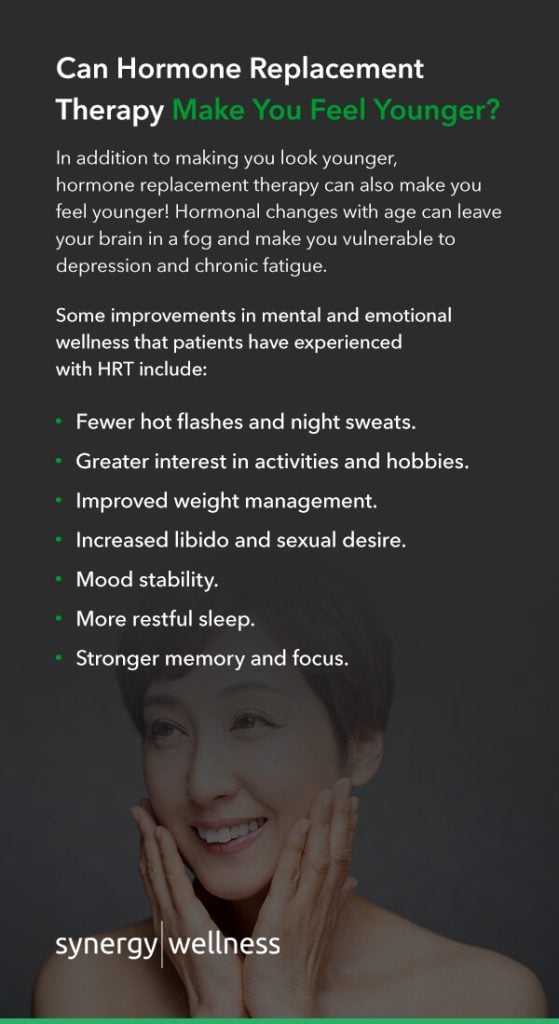
Can Hormone Replacement Therapy Make You Feel Younger?
In addition to making you look younger, hormone replacement therapy can also make you feel younger! While it cannot turn back the clock, it can provide you with youthful exuberance as you age with grace. Perhaps even more consequential than wrinkles and skin laxity are the effects of menopause, andropause and aging on your overall mood, energy and wellness. Hormonal changes with age can leave your brain in a fog and make you vulnerable to depression and chronic fatigue. These effects can make you feel older than your age.
Fortunately, the benefits of hormone replacement therapy are more than skin deep. They also extend to your mental and emotional health. Some improvements in mental and emotional wellness that patients have experienced with HRT include:
- Fewer hot flashes and night sweats.
- Greater interest in activities and hobbies.
- Improved weight management.
- Increased libido and sexual desire.
- Mood stability.
- More restful sleep.
- Stronger memory and focus.
Is HRT for Anti-Aging Right for You?
While HRT provides many anti-aging benefits, it is not always the right choice for everyone. Some individuals may have medical conditions or take medications that could harmfully interact with HRT, while others may not meet the threshold for hormonal imbalances to require HRT. It is essential to speak with your doctor before pursuing HRT for anti-aging to make sure you can safely receive this type of treatment.
HRT may not be suitable if you:
- Are pregnant or breastfeeding.
- Have experienced breast, ovarian or uterine cancer.
- Have a history of blood clots — HRT tablets are not recommended, but subcutaneous pellets may work.
- Have had heart disease or one or more strokes.
- Have liver disease or untreated high blood pressure — controlled blood pressure is essential for HRT.
Consult your doctor if you have any of the above conditions and are considering HRT for anti-aging. They may be able to modify your treatment or find alternative treatments if HRT is not suitable for you.
HRT for anti-aging could be right for you if none of the above conditions apply and you are experiencing any of the following symptoms:
- Anxiety or depression, especially if these symptoms are absent before menopause or andropause
- Brittle bones and nails
- Decreased libido or problems with sexual function
- Difficulty concentrating or remembering things
- Hot flashes
- Night sweats
- Vaginal dryness, burning, itching or pain during sex
- Wrinkles, fine lines and other aging signs
What Are the Options for Hormone Replacement Therapy for Your Skin?
You can choose from several options for taking hormone replacement therapy, including creams, pellets, patches, tablets and other applications. Depending on your symptoms, your doctor may recommend one option over another. Here are the different options for hormone replacement therapy:
- Creams: Creams and other topical applications like gels or sprays are options for HRT. To apply topical HRT options, rub or spray the HRT product onto an arm or leg. After your skin absorbs the product, it enters your bloodstream and begins to balance your hormone levels.
- Pellets: Pellets are tiny implants that your doctor inserts into the subcutaneous fat beneath your skin. Roughly the size of a grain of rice, inserting the pellets does not usually cause any pain. Once inserted, the pellets gradually release the specific hormone they are balancing into your bloodstream. This type of HRT is typically used for bio-identical hormone replacement therapy (BHRT). BHRT uses hormones that are molecularly identical to those naturally produced in your body. In contrast, traditional HRT uses synthetic hormones.
- Skin Patches: HRT patches are worn on the skin of your abdomen. Like topical HRT applications, skin patches deliver the replacement hormones through your skin and into your bloodstream. Depending on the dosage of the patch, they are worn and replaced every few days to one week.
- Tablets: HRT tablets or pills are the most common way doctors prescribe traditional HRT. Most HRT tablets require you to take them once a day with food, but some involve more complicated dosing routines.
- Vaginal HRT: Other options for HRT include vaginal applications, which come in creams, rings or tablets. Vaginal HRT is commonly prescribed for individuals who experience the menopausal symptoms of vaginal dryness, burning, itching or pain during sex. Patients typically replace vaginal rings every three months, take tablets daily and apply creams daily or several times a week.

What if You Stop Hormone Replacement Therapy for Your Skin?
Hormone replacement therapy is not intended as a life-long treatment option. Most doctors recommend that you stick with a dose that works until you’ve achieved the desired results. After quitting, some symptoms may return, but they should disappear within a few weeks or months.
If you are on a low dose, you may be able to quit HRT as soon as you achieve those results. However, most patients require a gradual tapering-off process so they do not experience withdrawal symptoms. That process often involves taking lower doses fewer times a week until you no longer need HRT.
Other Tips for Healthier-Looking Skin After Menopause
To maximize the benefits of HRT for your skin after menopause, it is also important to focus on eating healthy, exercising regularly and taking good care of your skin and hair. Here are some more tips for maintaining healthier-looking skin after menopause:
- Eat a nutrient- and vitamin-rich diet: Your diet plays a pivotal role in balancing your hormones and keeping your skin, hair and nails healthy. Make sure you consume lots of vitamin D, fatty acids, antioxidants, zinc, iron and vitamin C. Seafood, citrus and other types of fruit are great sources of the nutrients and vitamins you need to maintain healthy skin, hair and nails.
- Use gentle hair products: To keep your hair healthy, make sure you use gentle products that enrich your hair health. Harsh products commonly cause hair loss or damage when used over time.
- Exercise regularly: Regular exercise ensures good blood flow, which nourishes your skin cells to keep your skin firm and full.
- Implement a strong skincare routine: As you take HRT for anti-aging, make sure you take routine care of your skin. Keep it hydrated with a daily moisturizer and use gentle exfoliants to keep your skin smooth and fresh.
- Avoid too much UV exposure: Part of your skincare routine should also include limiting UV exposure. Make sure you apply sunscreen when spending time outside on sunny days and wear a hat. You should also limit the amount of time you spend in tanning beds.
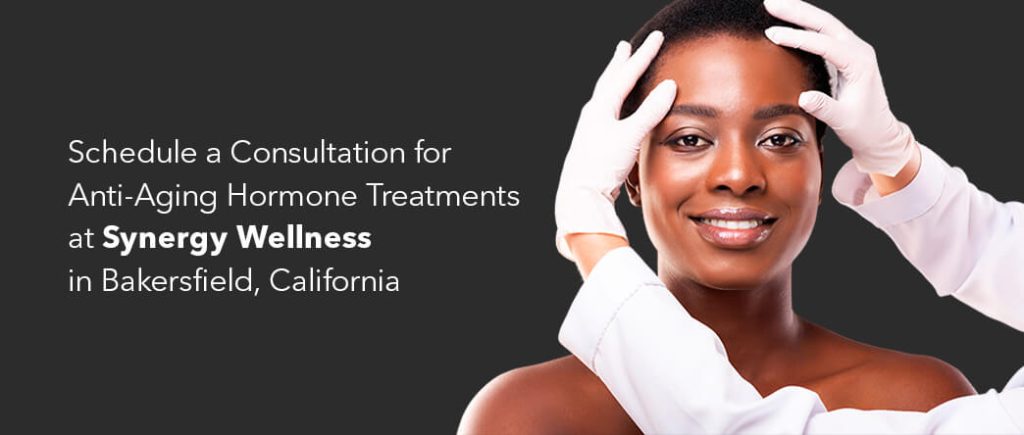
Schedule a Consultation for Anti-Aging Hormone Treatments in Bakersfield, California
If hormone replacement therapy for anti-aging sounds like something your skin could benefit from, we invite you to schedule a consultation with one of our HRT specialists at Synergy Wellness in Bakersfield, California! Our medical doctors and physician’s assistants have many years of experience providing cutting-edge hormone optimization treatments to our valued patients in Bakersfield and the surrounding area.


